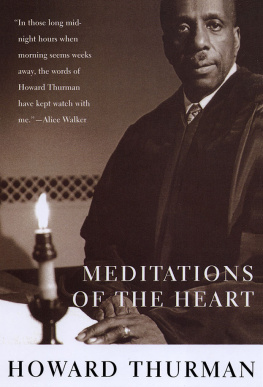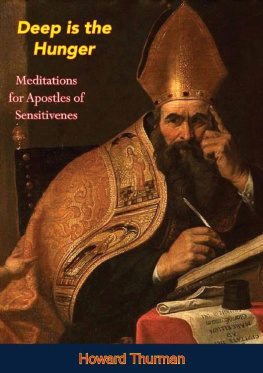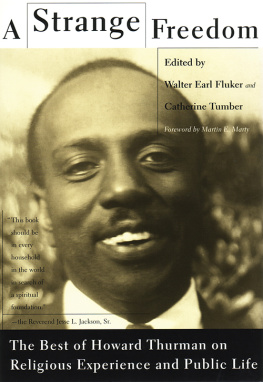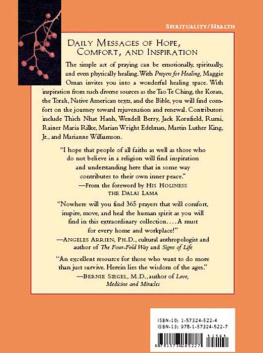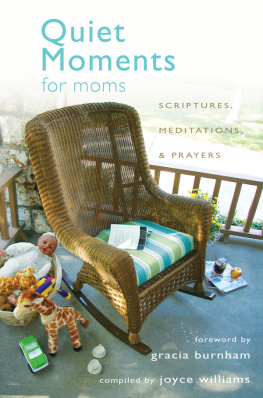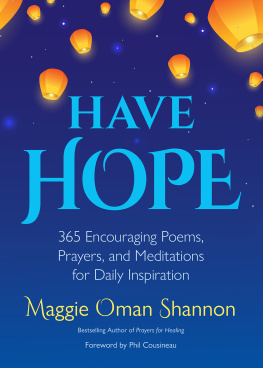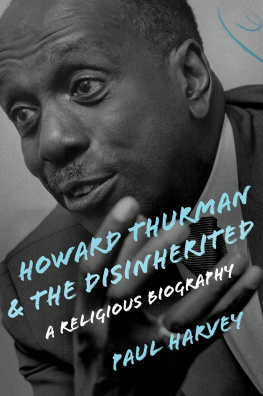Editors note:
We realize that inclusive language is noticeably absent in Howard Thurmans writings. As gifted and prophetic as he was, Howard Thurman was also a product of his times, and inclusive language was not a part of the social consciousness.
Regardless of language, the substance of Howard Thurmans work is inclusive. His life and theology were inclusive, and if he were writing today his language would more accurately reflect this worldview.
FOREWORD
This is volume two of Deep is the Hunger. These meditations were written originally for use by me and the congregation of Fellowship Church. Some of them were used as meditation working papers in the Quiet Time from ten-thirty to eleven oclock on Sunday morning. Others appeared on the back of the calendar for the regular weekly worship service. Each meditation comes out of what is essentially a laboratory situation. Their use has already been tested.
Due to the circumstances which brought them forth, there is no unifying theme by which they are held together. They are addressed to some of the deep and insistent needs of the human spirit, which needs know no age, clime, culture or group. They are needs that are universal and in which all men share. Their purpose is to focus the mind and the heart upon God as the Eternal Source and Goal of life. Wherever they seem stumbling, weak and stammering, understand that they are the utterances of one who sees through a glass darkly. Whatever light they may bring at any point in anothers darkness is but a glimmer of the Light that lighteth every man that cometh into the world.
My personal thanks are extended to all who have shared in any way in making this volume possible. Special appreciation goes to Miss Grace Marrett who studied the entire manuscript and, in addition to thoughtful suggestions, prepared the table of contents to make the book of more practical use to the reader; to Mrs. J. Stewart Burgess who helped in the earlier classification of material; to Mrs. Joseph Williams who typed the first copy; to Mrs. Alyce Walker, editor of the Growing Edge, for many helpful aids, and to my secretary, Mrs. Alice Ratner, without whose patience the necessary work on this volume would not have been done.
I
The Inward Sea
There is in every person an inward sea, and in that sea there is an island and on that island there is an altar and standing guard before that altar is the angel with the flaming sword. Nothing can get by that angel to be placed upon that altar unless it has the mark of your inner authority. Nothing passes the angel with the flaming sword to be placed upon your altar unless it be a part of the fluid area of your consent. This is your crucial link with the Eternal.
1. An Island of Peace within Ones Soul
A BEAUTIFUL and significant phrase, Island of Peace within ones own soul. The individual lives his life in the midst of a wide variety of stresses and strains. There are many tasks in which he is engaged that are not meaningful to him even though they are important in secondary ways. There are many responsibilities that are his by virtue of training, or family, or position. Again and again, decisions must be made as to small and large matters; each one involves him in devious ways. No one is ever free from the peculiar pressures of his own life. Each one has to deal with the evil aspects of life, with injustices inflicted upon him and injustices which he wittingly or unwittingly inflicts upon others. We are all of us deeply involved in the throes of our own weaknesses and strengths, expressed often in the profoundest conflicts within our own souls. The only hope for surcease, the only possibility of stability for the person, is to establish an Island of Peace within ones own soul. Here one brings for review the purposes and dreams to which ones life is tied. This is the place where there is no pretense, no dishonesty, no adulteration. What passes over the threshold is simon-pure. What one really thinks and feels about ones own life stands revealed; what one really thinks and feels about other people far and near is seen with every nuance honestly labeled: love is love, hate is hate, fear is fear. Well within the island is the Temple where God dwellsnot the God of the creed, the church, the family, but the God of ones heart. Into His Presence one comes with all of ones problems and faces His scrutiny. What a man is, what his plans are, what his authentic point is, where his life goesall is available to him in the Presence. How foolish it is, how terrible, if you have not found your Island of Peace within your own soul! It means that you are living without the discovery of your true home.
2. Silence is a Door to God
T HERE is very great virtue in the cultivation of silence, and strength to be found in using it as a door to God. Such a door opens within. When I have quieted down, I must spend some time in self-examination in the Presence of God. This is no facile admission of guilt for wrongs done or a too quick labeling of attitudes in negative terms. But it does mean lifting up a part of ones self and turning it over and over, viewing it from many angles and then holding it still as one waits for the movement of Gods spirit in judgment, in honesty and in understanding. To examine ones self in introspection and inner probing may become sheer morbidity, but to examine ones self in the climate and the mood of prayer, carries with it a kind of lift and positiveness that is at once the antidote to morbidity. Every period of prayer should provide for an experience of self-examination in the presence of God. Self-examination issues most often in a sense of sin, the acknowledgment of which is the first step in the forgiveness of God. It is at such a moment that a man sees that the wrongdoing of which he may be guilty is a wrongdoing against God. Against Thee and Thee only have I sinned and done this evil in Thy sight. Such is always the final testimony of the spirit in self-examination in the Presence of God. There may be, very directly following this phase of prayer, a time of thanksgiving. Thanksgiving in the Presence of God becomes more than perfunctory. Thanksgiving has implicit within the idea itself a sensitive appraisal. Suddenly, I may become aware that that which I thought was the sheer result of my own effort came my way despite my effort. In the Presence of God, His radiance picks up the magic in so much that I had taken for granted. Somehow in thanksgiving I see clearly, if but for a fleeting moment, that much, much has come my way as a normal part of my dependency, without my being aware of it. It is at such moments that I may become literally overwhelmed by a profound sense of the love and the grace of God. The very roots of my own pride lie exposed to the scrutiny of God, and if I can bear it over and over again, the very will to pride of that kind may be destroyed in me; yes, destroyed by the sheer love of God. Perhaps, it is always true that the test of my thanksgiving is the humility which it inspires. Self-examinationthanksgivinghumilitylet us experience them in our quiet time in the presence of God.
3. In Quiet One Discovers the Will of God

